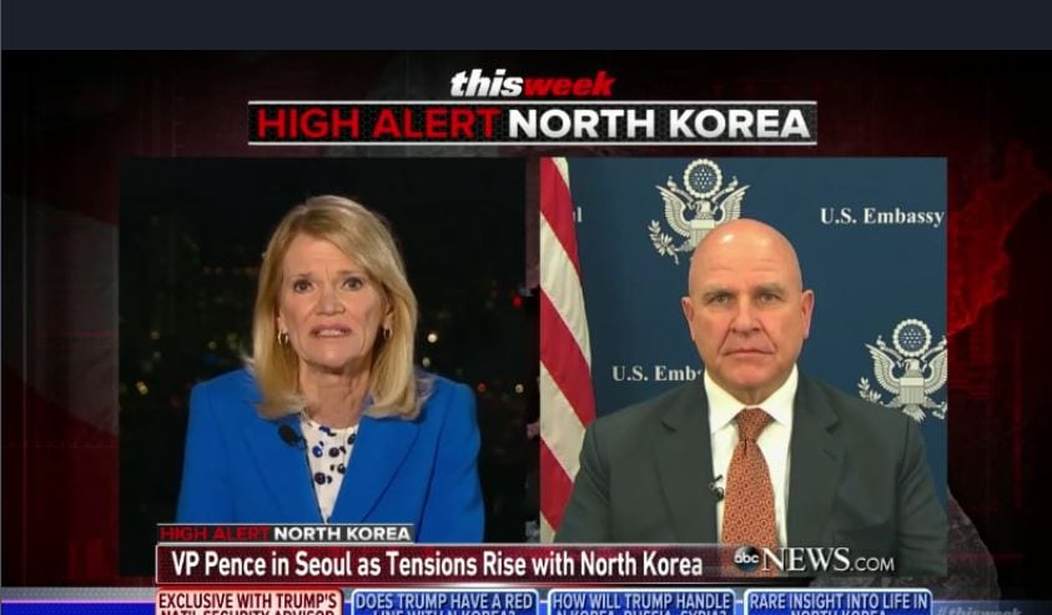National Security Adviser H. R. McMaster was on This Week with Martha Raddatz and the major topic of discussion was North Korea.
TRANSCRIPT
RADDATZ: Let’s go back to what you were saying before, and today a White House foreign policy adviser briefed reporters on Vice President Pence’s flight to Seoul and said, had North Korea tested a nuclear weapon, other actions would have been taken by the U.S. You hinted at some of that.
What would have happened? What was he talking about?
MCMASTER: Well, the president has made very clear that he is not in the business of announcing in advance exactly what he’s going to do in any particular situation. And I think what you saw last week with the president’s decisive response to the Assad regime, to mass murder of innocent people, including children, with chemical weapons, that this national security team is capable of rapidly responding to those sorts of crises or incidents and events and providing the president with options. And our president is clearly comfortable making tough decisions and respond.
RADDATZ: But the military option’s still on the table?
MCMASTER: Well, all our options on the table undergoing refinement and further development.
RADDATZ: And how close do you think North Korea is to having a nuclear weapon capable of reaching the United States?
MCMASTER: Well, you know, estimates in these sorts of things vary widely. What is clear is, as long — as long as their behavior continues, as long as they continue missile development — even though this was a failed missile, they get better and they learn lessons. So what’s critical is for them to stop this destabilizing behavior, stop the development of these weapons, and denuclearize. And that is the best interests of everyone in the region, and ultimately it’s in the best interests of the North Korean people as well.
RADDATZ: North Korea’s Vice Foreign Minister said Friday that the Trump administration is more vicious and more aggressive than the Obama administration, saying that Trump’s aggressive tweets were making trouble.
Does the aggressive language increase the likelihood of conflict?
MCMASTER: I think it should make clear to the North Korean regime that it is in their best interest to stop the development of these weapons, to stop the development of these missiles, and to denuclearize the peninsula. And so I think while it’s unclear — and want to — do not want to telegraph in any way how we’ll respond to certain incidents, it’s clear that the president is determined not to allow this kind of capability to threaten the United States. And our president will take action that is in the best interest of the American people.
RADDATZ: You know, one of the big concerns here, General McMaster, is how North Korea would respond to aggressive action or some sort of preemptive strike. How do you think they would respond?
MCMASTER: Well, that’s what particularly difficult about — about dealing with this regime, is that it is unpredictable. This is someone who has demonstrated his brutality by murdering his own brother, by murdering others in his family, by imprisoning large numbers of people in horrible conditions for no reason, for political reasons. So this regime has given the world reason for concern. And that includes — that includes the Chinese people and the Chinese leadership as well.
I mean, what Kim Jong-Un is doing is a threat to all people in the region and globally as well. I mean, this is someone who has said not only does he want to develop a nuclear weapon, but he wants to use it to coerce others. He’s said that he was willing to proliferate nuclear weapons once he develops them. And so this a grave threat to all people.
RADDATZ: You know, you heard what President Trump said about China in that primary debate, but this week he said, after listening to President Xi, he realized it’s not so easy. Are you truly confident you can get China to pressure North Korea in a meaningful way?
MCMASTER: Well, we’ll see what happens. What we do know is that, in the midst of responding to the mass murder of the Syrian regime, the president and the first lady hosted an extraordinarily successful conference, summit, with President Xi and his team. And not only did they establish a very warm relationship, but since that time they’ve worked together on other issues. On North Korea they worked together. But they worked together as well in connection with the response to the mass murder on the part of the Assad regime in connection with the U.N. vote. I think President Xi was courageous in distancing himself from the Russians, isolating really the Russians and the Bolivians.
And this all occurred on the same day that President Trump hosted the Secretary-General of NATO, representing our wonderful NATO allies. And I think the world saw that, and they saw, well, what club do you want to be in? The Russian-Bolivian club? Or the — in the club with the United States, working together on our mutual interests and the interests of peace, security.
And I think it was just a great week of the United States, in thanks mainly to our president’s (INAUDIBLE).
RADDATZ: You know, you sound very confident. President Trump of course sounds very confident. But one final question on this: every president since Bill Clinton has said the U.S. will not tolerate a nuclear armed North Korea, and North Korea has only grown stronger in their capabilities. So why do you think President Trump will have a different outcome?
MCMASTER: Well, as you mentioned, this is a problem that has been passed down from multiple administrations. But our president, I think, it’s really the consensus with the president, our key allies in the regions — Japan and South Korea in particular, but also the Chinese leadership — that this problem is coming to a head. And so it’s time for us to undertake all actions we can, short of a military option, to try to resolve this peacefully.
And so we’re going to rely on our allies like we always do, but we’re also going to have to rely on Chinese leadership. I mean, North Korea is very vulnerable to pressure from the Chinese. Eighty percent of North Korea’s trade comes from China. All of their energy requirements are fulfilled by China.
So in the coming weeks, months, I think there’s a great opportunity for all of us — all of us who are really the threat now of this unpredictable regime — to take action short of armed conflict, so we can avoid the worst.
Were I going to point out clear takeaway messages from this interview, this is what I’d key on:
1. The direct linkage of the attack on Syria to North Korea is clearly meant to send a message to Pyongyang.
2. North Korea has the Trump administration’s full and undivided attention.
3. McMaster is not convinced that China is the silver bullet to solve the North Korean problem but he seems convinced that China will do some things to limit North Korea’s behavior.
4. There seems to be a feeling that the North Korean nuclear program must be stopped that goes far beyond mere rhetoric.
On the whole, I think McMaster did an exceptional job of sticking to his talking points and not making any news he did not intend to make.














Join the conversation as a VIP Member